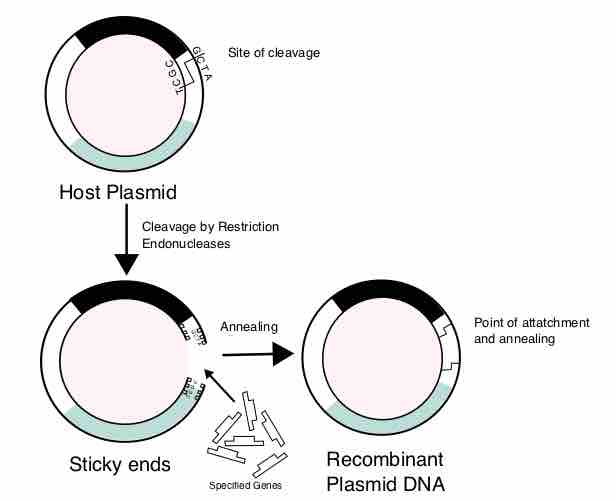Recombinant DNA technology is the latest biochemical analysis that came about to satisfy the need for specific DNA segments. In this process, surrounding DNA from an existing cell is clipped in the desired amount of segments so that it can be copied millions of times .

Construction of recombinant DNA
A foreign DNA fragment is inserted into a plasmid vector. In this example, the gene indicated by the white color is inactivated upon insertion of the foreign DNA fragment.
Recombinant DNA technology engineers microbial cells for producing foreign proteins, and its success solely depends on the precise reading of equivalent genes made with the help of bacterial cell machinery. This process has been responsible for fueling many advances related to modern molecular biology. The last two decades of cloned-DNA sequence studies have revealed detailed knowledge about gene structure as well as its organization. It has provided hints to regulatory pathways with the aid of which gene expression in myriad cell types is controlled by the cells, especially in those organisms having body plan with basic vertebrae structure.
Recombinant DNA technology, apart from being an important tool of scientific research, has also played a vital role in the diagnosis and treatment of various diseases, especially those belonging to genetic disorders.
Some of the recent advances made possible by recombinant DNA technology are:
1. Isolating proteins in large quantities: many recombinant products are now available, including follicle stimulating hormone (FSH), Follistim AQ vial, growth hormone, insulin and some other proteins.
2. Making possible mutation identification: due to this technology, people can be easily tested for mutated protein presence that can lead to breast cancer, neurofibromatosis, and retinoblastoma.
3. Hereditary diseases carrier diagnosis: tests now available to determine if a person is carrying the gene for cystic fibrosis, the Tay-Sachs diseases, Huntington's disease or Duchenne muscular dystrophy.
4. Gene transfer from one organism to other: the advanced gene therapy can benefit people with cystic fibrosis, vascular disease, rheumatoid arthritis and specific types of cancers.